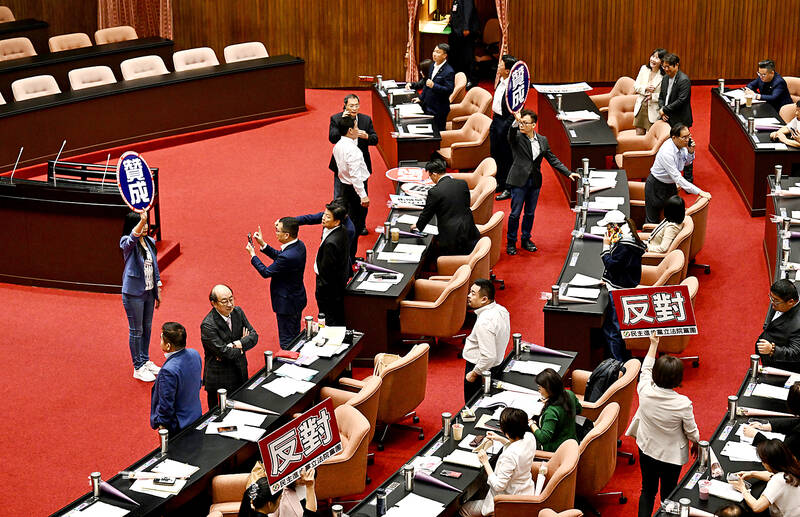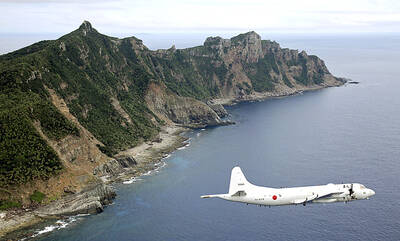Ruling and opposition lawmakers yesterday agreed to invite president-elect William Lai (賴清德) to give a state of the nation address at the Legislative Yuan after his inauguration on May 20.
The consensus was reached during cross-caucus negotiations convened by Legislative Speaker Han Kuo-yu (韓國瑜).
Details on when and how the address is to be conducted are to be discussed in new cross-caucus negotiations on Monday.

Photo: Lo Pei-de, Taipei Times
KMT caucus whip Fu Kun-chi said that the KMT caucus’ proposal to invite Lai to give the address was based on Article 15-2 of the Act on Exercising Legislative Yuan Powers (立法院職權行使法).
The invitation is also consistent with the Constitution in that the president should deliver a state of the nation address to the Legislative Yuan, he added.
Fu was referring to Article 4-3 of the Additional Articles of the Constitution of the Republic of China, which stipulates that “when the Legislative Yuan convenes each year, it may hear a report on the state of the nation by the president.”
Fu said Lai had previously expressed a willingness to make such an appearance, and the KMT would respect whatever format he chooses for his address.
However, it would be best if the president’s address came before the premiere’s interpellation, Fu said, adding that the KMT hoped having the president deliver a state of the nation address would become standard practice.
DPP caucus whip Ker Chien-ming (柯建銘) said that governing and opposition lawmakers are creating history with the invitation for the president to address the legislature.
As to whether the president’s speech should precede the premier’s interpellation, Ker said the issue warrants further discussion.
Questions remained as to whether lawmakers would be allowed to question the president after the speech.
Ker said that the Constitution should be the final arbitrator of what is permissible and demanding that the president answer questions on the spot is unconstitutional.
He expressed the hope that the legislature can make history instead of being locked in constant infighting, which harms the nation.
Taiwan People’s Party Legislator Chang Chi-kai (張啟楷) said that a new legislative session is an opportune time for changes, urging all parties whose opinions differ on how a presidential question-and-answer segment should be conducted to work together and move forward, not backward.
Constitutional law expert Chen In-chin (陳英鈐) said the Constitution does not explicitly state whether the president or the premier should go first in speaking before the legislature.
Most importantly, the Legislative Yuan cannot force the president to deliver their address before the premier does, he said, adding that both sides should talk about a suitable time.
The president appearing before the legislature to deliver a state of the nation address is fundamentally different than the premier appearing before the legislature for interpellation, said Chen, a professor at the National Central University’s Graduate Institute of Law and Government.
Taiwan has a semi-presidential system, with an executive branch legally beholden to answer to the legislative branch, while the president answers to the people, not the legislature, he said.
A state of the nation address allows the president to explain their policy platform to the people, but does not make them answerable to the legislature, Chen said.
Additional reporting by CNA

MISINFORMATION: The generated content tends to adopt China’s official stance, such as ‘Taiwan is currently governed by the Chinese central government,’ the NSB said Five China-developed artificial intelligence (AI) language models exhibit cybersecurity risks and content biases, an inspection conducted by the National Security Bureau (NSB) showed. The five AI tools are: DeepSeek, Doubao (豆包), Yiyan (文心一言), Tongyi (通義千問) and Yuanbao (騰訊元寶), the bureau said, advising people to remain vigilant to protect personal data privacy and corporate business secrets. The NSB said it, in accordance with the National Intelligence Services Act (國家情報工作法), has reviewed international cybersecurity reports and intelligence, and coordinated with the Ministry of Justice Investigation Bureau and the National Police Agency’s Criminal Investigation Bureau to conduct an inspection of China-made AI language

LIMITS: While China increases military pressure on Taiwan and expands its use of cognitive warfare, it is unwilling to target tech supply chains, the report said US and Taiwan military officials have warned that the Chinese People’s Liberation Army (PLA) could implement a blockade within “a matter of hours” and need only “minimal conversion time” prior to an attack on Taiwan, a report released on Tuesday by the US Senate’s China Economic and Security Review Commission said. “While there is no indication that China is planning an imminent attack, the United States and its allies and partners can no longer assume that a Taiwan contingency is a distant possibility for which they would have ample time to prepare,” it said. The commission made the comments in its annual

‘TROUBLEMAKER’: Most countries believe that it is China — rather than Taiwan — that is undermining regional peace and stability with its coercive tactics, the president said China should restrain itself and refrain from being a troublemaker that sabotages peace and stability in the Indo-Pacific region, President William Lai (賴清德) said yesterday. Lai made the remarks after China Coast Guard vessels sailed into disputed waters off the Senkaku Islands — known as the Diaoyutai Islands (釣魚台) in Taiwan — following a remark Japanese Prime Minister Sanae Takaichi made regarding Taiwan. Takaichi during a parliamentary session on Nov. 7 said that a “Taiwan contingency” involving a Chinese naval blockade could qualify as a “survival-threatening situation” for Japan, and trigger Tokyo’s deployment of its military for defense. Asked about the escalating tensions

DISPUTE: A Chinese official prompted a formal protest from Tokyo by saying that ‘the dirty head that sticks itself out must be cut off,’ after Takaichi’s Taiwan remarks Four armed China Coast Guard vessels yesterday morning sailed through disputed waters controlled by Japan, amid a diplomatic spat following Japanese Prime Minister Sanae Takaichi’s comments on Taiwan. The four ships sailed around the Senkaku Islands — known as the Diaoyutai Islands (釣魚台) to Taiwan, and which Taiwan and China also claim — on Saturday before entering Japanese waters yesterday and left, the Japan Coast Guard said. The China Coast Guard said in a statement that it carried out a “rights enforcement patrol” through the waters and that it was a lawful operation. As of the end of last month,